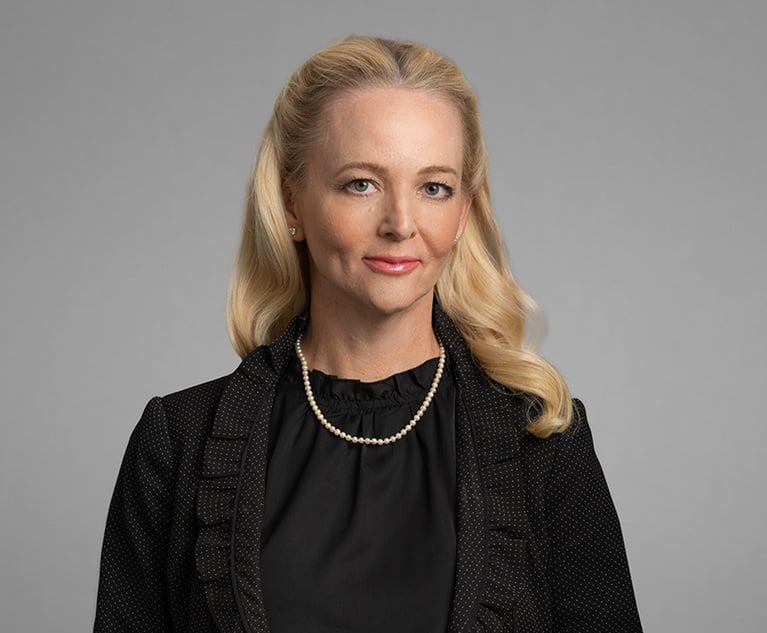Federal Judges: FRCP, Digital Evidence Laws Have Long Way to Go
Three former federal judges offered their takes on the biggest challenges facing the judiciary in a panel sponsored by Thomson Reuters and the Association of Certified E-Discovery Specialists.
January 31, 2018 at 11:59 AM
5 minute read
The original version of this story was published on Legal Tech News

On Tuesday night during Legalweek New York 2018, Thomson Reuters and the Association of Certified E-Discovery Specialists held a “Back to the Future: Predictions from the Bench” discussion with three former federal judges.
The session saw the judges examine topics ranging from the effectiveness of the 2015 amendments to the Federal Rules of Civil Procedure (FRCP) on civil proceedings and judges' ability to sanction to legal challenges involved with issuing search warrants for electronic evidence.
Here are three key takeaways from the judges' discussion:
Sanctions Are Far From Dead
FRCP Rule 37(e) was crafted in part to rein in the amount of sanctions civil parties occur when mishandling electronic evidence. But for U.S. District Judge Xavier Rodriguez of the Western District of Texas, the rule hasn't yet had its intended effect.
“I don't think 37(e) has had the impact that the framers intended,” he said. “We took a poll of judges a few months ago and determined they haven't seen a significant downturn in the number of sanction motions. [The rule] may have ameliorated the fear of counsel for facing the most-severe sanctions, but it hasn't reduced the number of sanctions.”
Rodriguez added that, because of the new Rule 37(e), judges' “ability to deter bad behavior has been greatly diminished, and I think what you are seeing in some of the case law is some judges looking for other avenues to sanction just because 37(e) tends to be too difficult.”
He noted, however, that judges need not look far for rules that enable sanctions, specifically citing FRCP Rules 16(f) and 26(g).
“Papered to Death”
Former Magistrate Judge David Waxse of the District of Kansas noted that, at its most fundamental level, the amendments to the FRCP expanded the responsibility to make civil proceedings “just, speedy and inexpensive” from judges to lawyers.
“I think, and I've been saying this for years and years now, that lawyers have to come to grips with the fact that the litigation system is not set up to give them a place to play or make lots of money. The purpose of the ligation system is to get disputes resolved,” he said.
But despite the FRCP's intention, civil litigation can still be as inefficient and laborious as ever. “Everybody files a motion to dismiss, everybody files a motion to summary judgment, and somehow if you get past this, the expert will be challenged by a Daubert challenge,” said Rodriguez. “That's just what we see; we are papered to death here.”
He added that such inefficiencies cut to the core of the civil litigation system: “We are a commodity. … We are competing against arbitration, and if we don't make the civil justice system speedier or economic—you know there's a reason why everybody goes to arbitration now.”
But Waxse noted that the current FRCP, at least on paper, give judges the tools to combat such inefficiencies. “If you use 26(g) properly, a lot of people would be sanctioned … because 26(g) says, if you don't have a basis for making these statements you are making, the court shall sanction you.”
The Digital Evidence Divide
In today's digital world, judges are seeing firsthand how the rise of digital evidence is outpacing the ability of the law to regulate it. “The law is very unclear on how you apply the Fourth Amendment to situations with electronic information,” said Waxse. “I kept seeing government requests for search warrants that were exceedingly broad; they were unconstitutionally broad.”
Former U.S. Magistrate Judge James Francis of the Southern District of New York noted that one of the most important cases that may define how digital evidence is handled in the modern age is one he ruled on a few years ago: Microsoft Corp. v. United States.
The case involved search warrants issued to Microsoft under the Stored Communications Act by the U.S. government. The warrants sought data from a Microsoft subscriber based in Ireland, but Microsoft moved to quash the warrant under the grounds that such SCA warrants do not apply extraterritorially.
Francis denied the motion to quash. However, “as case went up [the court system], the district judge reaffirmed, the Second Circuit reversed me and the Court of Appeals split four to four on whether to take the case en banc, and now the Supreme Court has taken it on cert, and the case will be argued in February.”
The case has caught the attention of many privacy and tech advocates. Francis noted there was even an amicus brief filed on behalf of Microsoft from computer scientists who discussed the technicalities of where digital evidence is located “based on where the electrons reside.”
Francis said he believes the Supreme Court ultimately will rule on the case “narrowly as they can, and it will really boil down to whether they view an order under the Stored Communications Act as having its primary effect in the U.S. or in Ireland.”
This content has been archived. It is available through our partners, LexisNexis® and Bloomberg Law.
To view this content, please continue to their sites.
Not a Lexis Subscriber?
Subscribe Now
Not a Bloomberg Law Subscriber?
Subscribe Now
NOT FOR REPRINT
© 2025 ALM Global, LLC, All Rights Reserved. Request academic re-use from www.copyright.com. All other uses, submit a request to [email protected]. For more information visit Asset & Logo Licensing.
You Might Like
View All
King & Spalding E-Discovery Director Jumps to Nebraska Women-Owned Firm
4 minute read
Less Is More: The Risks of Excessive Data Collection from Mobile Devices
6 minute read
Trending Stories
- 1U.S. Supreme Court Has No Jurisdiction Over Trump's New York Criminal Case: Prosecutors
- 2The Law Firm Disrupted: With KPMG's Proposed Entry, Arizona's Liberalized Legal Market is Getting Interesting
- 3Womble Bond Dickinson Adds New Leaders as Merger Is Completed
- 4Family's Disability Discrimination Suit Cleared to Go Forward Against Six Flags
- 5Turning Over Legal Tedium to AI Requires Lots of Unglamorous Work on Front End
Who Got The Work
Michael G. Bongiorno, Andrew Scott Dulberg and Elizabeth E. Driscoll from Wilmer Cutler Pickering Hale and Dorr have stepped in to represent Symbotic Inc., an A.I.-enabled technology platform that focuses on increasing supply chain efficiency, and other defendants in a pending shareholder derivative lawsuit. The case, filed Oct. 2 in Massachusetts District Court by the Brown Law Firm on behalf of Stephen Austen, accuses certain officers and directors of misleading investors in regard to Symbotic's potential for margin growth by failing to disclose that the company was not equipped to timely deploy its systems or manage expenses through project delays. The case, assigned to U.S. District Judge Nathaniel M. Gorton, is 1:24-cv-12522, Austen v. Cohen et al.
Who Got The Work
Edmund Polubinski and Marie Killmond of Davis Polk & Wardwell have entered appearances for data platform software development company MongoDB and other defendants in a pending shareholder derivative lawsuit. The action, filed Oct. 7 in New York Southern District Court by the Brown Law Firm, accuses the company's directors and/or officers of falsely expressing confidence in the company’s restructuring of its sales incentive plan and downplaying the severity of decreases in its upfront commitments. The case is 1:24-cv-07594, Roy v. Ittycheria et al.
Who Got The Work
Amy O. Bruchs and Kurt F. Ellison of Michael Best & Friedrich have entered appearances for Epic Systems Corp. in a pending employment discrimination lawsuit. The suit was filed Sept. 7 in Wisconsin Western District Court by Levine Eisberner LLC and Siri & Glimstad on behalf of a project manager who claims that he was wrongfully terminated after applying for a religious exemption to the defendant's COVID-19 vaccine mandate. The case, assigned to U.S. Magistrate Judge Anita Marie Boor, is 3:24-cv-00630, Secker, Nathan v. Epic Systems Corporation.
Who Got The Work
David X. Sullivan, Thomas J. Finn and Gregory A. Hall from McCarter & English have entered appearances for Sunrun Installation Services in a pending civil rights lawsuit. The complaint was filed Sept. 4 in Connecticut District Court by attorney Robert M. Berke on behalf of former employee George Edward Steins, who was arrested and charged with employing an unregistered home improvement salesperson. The complaint alleges that had Sunrun informed the Connecticut Department of Consumer Protection that the plaintiff's employment had ended in 2017 and that he no longer held Sunrun's home improvement contractor license, he would not have been hit with charges, which were dismissed in May 2024. The case, assigned to U.S. District Judge Jeffrey A. Meyer, is 3:24-cv-01423, Steins v. Sunrun, Inc. et al.
Who Got The Work
Greenberg Traurig shareholder Joshua L. Raskin has entered an appearance for boohoo.com UK Ltd. in a pending patent infringement lawsuit. The suit, filed Sept. 3 in Texas Eastern District Court by Rozier Hardt McDonough on behalf of Alto Dynamics, asserts five patents related to an online shopping platform. The case, assigned to U.S. District Judge Rodney Gilstrap, is 2:24-cv-00719, Alto Dynamics, LLC v. boohoo.com UK Limited.
Featured Firms
Law Offices of Gary Martin Hays & Associates, P.C.
(470) 294-1674
Law Offices of Mark E. Salomone
(857) 444-6468
Smith & Hassler
(713) 739-1250









